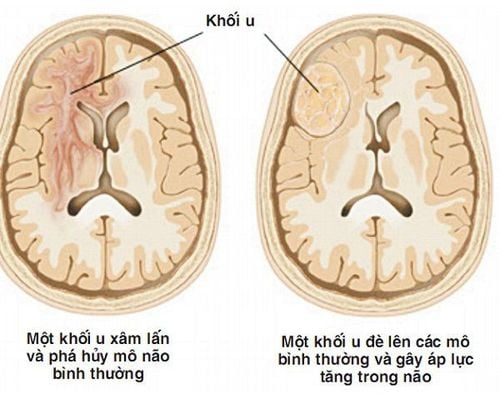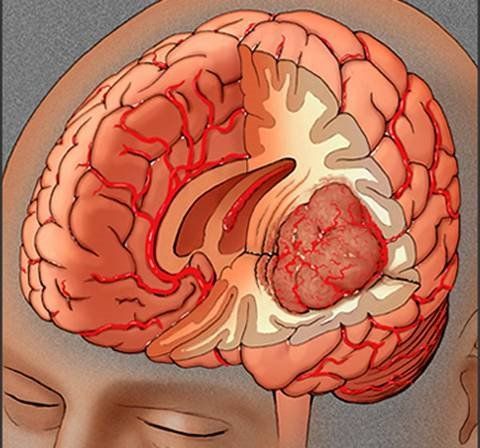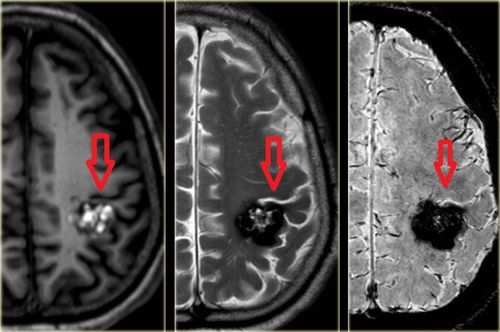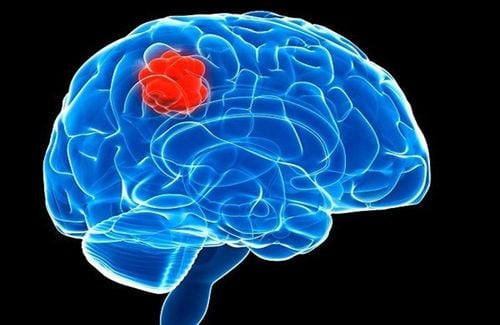This is an automatically translated article.
This article is expertly consulted by Master, Doctor Bui Ngoc Phuong Hoa - General Internal Medicine - Department of Medical Examination & Internal Medicine - Vinmec Danang International General Hospital.Signs of brain tumors are often unspecific, so the disease is detected late and encounters a lot of difficulties in the treatment process, the consequences it leaves are also extremely serious.
1. What is a brain tumor?

2. Characteristics of brain tumors
There are many different types of brain tumors, of which more than 50% of intracranial tumors are tumors in brain tissue. The remaining tumors are those originating from the meninges, cranial nerves, metastatic tumors, pituitary gland....Tumors in the brain often have slow progression, especially tumors of tissue. Brain. By removing more water that brain tissue contains than other tissues, the brain will have time to adapt to a certain extent. This leads to clinical symptoms that will also appear slowly and insidiously. The clinical picture is severe and the course is clearer if the tumor is infiltrative and grows rapidly, the surrounding circulatory system is often compressed by this brain tumor, causing cerebral edema due to vascular mechanisms.
For tumors with cysts inside, blood vessels proliferate, causing internal bleeding, which can easily be confused with an acute disease.
With the appearance of a tumor, the pressure in the cavity will not be equal. To equalize the pressure, brain tissue is pushed from one compartment to another.
3. Signs of brain tumor

Depending on the location of the tumor, its size, type and growth rate, the symptoms present will vary.
The following are some common signs of brain tumors:
Epilepsy: It is reported that about 40% of brain tumor cases have seizures and increased intracranial pressure. The tumor presses on nerve cells in the brain, causing changes in the electrical signals in the brain, causing seizures. Seizures are sometimes the first sign of brain tumor symptoms. Brain tumors are not always the cause of seizures. Headache: About 50% of patients with brain tumors present with severe headache. Sensitive blood vessels and nerve fibers in the brain are affected by the brain tumor. The tumor has taken up space in the skull, causing the patient to feel severe and continuous pain later on, which may be accompanied by a feeling of nausea and vomiting. The headache is persistent and the patient will feel more pain in the morning when he wakes up. Headaches will become worse when the patient coughs, changes position, head position, or exercises. Using common pain relievers does not help with headaches. However, when a severe headache occurs, it does not mean that you have a brain tumor because this is also a sign of many other diseases such as insomnia, stroke... Mood and personality changes: Brain functions can be destroyed by brain tumors, this affects the personality and behavior of the person, causing abnormal mood swings. This symptom is caused by a tumor located in a certain location of the brain such as the frontal lobe, the temporal lobe... The mood swings can also be caused by chemotherapy or other methods. cancer treatment. Memory impairment: Brain tumors in the frontal and temporal lobes cause memory problems. Your ability to reason and make decisions is also affected if brain tumors in the frontal and parietal lobes develop. For example, you can not work together or have memory problems, confused some simple things ... At any stage of the disease, signs of memory impairment can appear. Chemotherapy, radiation therapy, or cancer treatments can all cause memory loss in people with brain tumors. Depression: A common sign in brain tumor patients is depression, even with the patient's caregivers, depression can occur during treatment. People with depression will often feel bored, lose interest in things they used to like, have trouble sleeping, have insomnia, have thoughts of self-harm, suicide, self-doubt, ... Vomiting and sad Vomiting: In the early stages of the disease, vomiting and nausea may appear in the patient due to the hormone imbalance caused by the tumor. This symptom can also be caused by a side effect of tumor treatment (chemotherapy, radiation, ...) Feeling tired: due to the impact of a brain tumor, you feel exhausted, or sad. daytime sleep, impaired concentration, irritability, and often irritability. The treatment process also makes the patient tired. Numbness, weakness: This condition tends to appear on one side of the body. Focal neurological signs, blurred vision, double vision, tinnitus, hearing loss, paralysis of cranial nerves,... When you see some of the warning signs of brain tumors mentioned above or any other abnormal signs any part of the body, patients need to go to medical facilities so that doctors can diagnose the disease as soon as possible. Vinmec International General Hospital is the leading effective medical facility for treating brain tumors in particular and neurological diseases in general.
With fully equipped with modern equipment, the most advanced machines today such as: G.E 3.0 CT scanner (MRI), CT SCAN Toshiba 640 slices, cerebral angiogram, MRA and CTA... Doctors at Vinmec can easily detect, diagnose, and plan treatment thanks to the clear and detailed images obtained. Not only brain tumors, but also effectively applied to other brain and spinal diseases such as: brain degeneration, traumatic brain injury, cerebrovascular disease, cerebral aneurysm... The patient was treated and Rehabilitation in modern wards, fully equipped with international standards, helping patients feel comfortable, maximum support for the treatment process. Master. Doctor Bui Ngoc Phuong Hoa has more than 24 years of experience in the field of neuropsychology. Doctor Hoa was formerly Deputy Head of the Department of Neurology - Quang Ngai Provincial General Hospital and participated in many continuous training courses on Epilepsy, Cerebrovascular Accident, Alzheimer's, Movement Disorders, Geriatrics. Endocrine Pathology.
Please dial HOTLINE for more information or register for an appointment HERE. Download MyVinmec app to make appointments faster and to manage your bookings easily.














